Tips For Improving Employee Development

It can be challenging to determine which initiatives will have the most impact on your company, and every company has its own list of priorities. But even though priorities might be different, there is one thing that you can be certain of. The development of your employees should be a top priority, no matter what. At the end of the day, you need your employees to be able to perform to the best of their ability if you want your organization to be successful.
Many organizations underestimate the difficulties associated with proper employee development or lack thereof. It’s not enough just to give out the occasional gift card as a reward for hard work or host an office lunch every few months. Time, care, and consideration should be put into employee development. Regardless of their job within your organization, every employee wants to be treated well. Supporting their professional growth and personal development is an effective way to achieve this. Long-term initiatives like employee development lead to short-term benefits like improved performance and productivity, lower turnover rates, more loyalty, and more job satisfaction overall.

Offer Plenty of Professional Training
The best way to ensure your employees’ success in their roles is to provide them with all the tools and resources they need. Those resources should include access to professional training. Professional training isn’t just for employees who want to advance, it starts from day one. When hiring new employees, create a knowledge base containing critical information and best practices for new hires from the first day. Since remote employees can’t as easily access help when needed, creating a detailed training plan is especially important for those who are not working in the office.
Teach Your Managers How to Coach Effectively
Managers need to know the best ways to encourage and coach their employees in order to achieve results. Anyone in a leadership position should take the time to learn their team’s strengths, what drains them, and what motivates them to help guide them on their path to success. To accomplish this, managers should be asking the right questions at the right interval. Some examples of questions you can ask during one-on-one conversations include:
- What challenges are getting in your way right now?
- Is there anything I can do to become a better leader?
- How fulfilled are you feeling in your position?
Engaging in regular conversations with your employees will also help leaders to ensure they have close relationships with them. Moreover, as a result of these conversations, a more psychologically safe environment will be created for employees to express their feelings and thoughts openly and honestly.
Promote Collaboration Between Different Departments
Collaboration within a department is, obviously, essential. But so is collaboration across different departments. When an organization excels at cross-departmental training, it can bridge the gap between cultures, provide employees with beneficial experiences in other departments, and foster a sense of empathy throughout the company. But the fact of the matter is, this can take some encouragement, as most teams don’t naturally collaborate. Consider, for example, how valuable it is for a marketing department to have a solid understanding of how the sales department operates, and vice versa. Even though these two departments may not integrate or mingle on a regular basis, there will likely be times when they will need to utilize one another. In order for employees in each department to develop, they need to be able to work with and understand the jobs of other departments within the organization.
Put an Emphasis on Soft Skills
Unfortunately, the importance of soft skills is often overlooked in many corporate environments. But soft skills actually take a while to master and develop, and thus care should be taken to ensure that employees are constantly improving their soft skills. Why? Well, organizations are made up of people who work together, so it’s important to encourage skills like collaboration and communication within the workplace.
Take The Time for Employee Personal Development
Newsflash: Your employees don’t exist merely for the purpose of serving your organization. All of your employees have physical, mental, and emotional characteristics and health that need to be take care of in order for them to perform well. Thus, personal development needs to be closely considered if employees are to succeed on a personal and professional level. This includes:
Intellectual Stimulation and Growth
Keeping your employees’ minds sharp should be of utmost priority to your organization. Intellectual information that your employees have access to doesn’t always have to be business-related. Books, webinars, and other intellectually stimulating materials can be about almost anything. The fact of the matter is, just accessing such materials can be very beneficial for your employees. You can also consider providing access to continuing education for your employees in order to further encourage intellectual growth.
Physical Health
Physically healthy employees are more likely to feel good at work, and thus perform better. Physical health should be of particular importance for companies whose employees spend a lot of time sitting at a desk or staring at a computer screen. You can show that you care about your people as people by encouraging them to step away from their desks when the day is done and allowing them to practice more self-care.
Emotional Health
It’s important that organizations pay close attention to how their employees are fairing emotionally. Poor emotional health can have a huge negative effect on productivity, job satisfaction, and performance. Check in regularly with your employees to gauge their emotional health.
Give your employees the tools they need to do their job and resources that can help them improve and advance, and you’ll see a world of change. It’s almost a guarantee that with the right assistance, you will see substantial employee development that can work wonders for your company. What’s more, investing in your employees’ development shows that you care, and can be very beneficial in terms of retention and keeping turnover rates low.